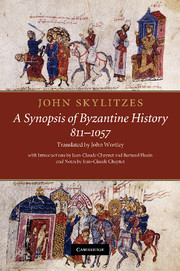Book contents
- Frontmatter
- Contents
- The English translator’s Preface
- Introduction
- Re-writing history: John Skylitzes’ Synopsis historion
- Foreword
- Chapter 1 Michael I Rangabe, the Kouropalates [811–813]
- Chapter 2 Leo V the Armenian [813–820]
- Chapter 3 Michael II the Stammerer [820–829]
- Chapter 4 Theophilos [829–842]
- Chapter 5 Michael III, the son of Theophilos [842–867], and his mother Theodora [842–862]
- Chapter 6 Basil I Kephalas, the Macedonian [867–886]
- Chapter 7 Leo VI the Philosopher (the Wise) [886–912]
- Chapter 8 Alexander [912–913]
- Chapter 9 Constantine VII, Porphyrogennetos [913–959]
- Chapter 10 Romanos I Lekapenos [919–944]
- Chapter 11 Constantine VII [944–959]
- Chapter 12 Romanos II the Younger [959–963]
- Chapter 13 Basil II Bulgaroktonos and Constantine VIII [976–1025]
- Chapter 14 Nikephoros II Phokas [963–969]
- Chapter 15 John I Tzimiskes [969–976]
- Chapter 16 Basil II and Constantine VIII bis [976–1025]
- Chapter 17 Constantine VIII [1025–1028]
- Chapter 18 Romanos III Argyros [1028–1034]
- Chapter 19 Michael IV the Paphlagonian [1034–1041]
- Chapter 20 Michael V Kalaphates [1041–1042]
- Chapter 21 Constantine IX Monomachos [1042–1055]
- Chapter 22 Theodora [1055–1056]
- Chapter 23 Michael VI the Elder/Stratiotikos [1056–1057]
- Glossary
- Bibliography
- Index
- References
Chapter 18 - Romanos III Argyros [1028–1034]
Published online by Cambridge University Press: 05 July 2014
- Frontmatter
- Contents
- The English translator’s Preface
- Introduction
- Re-writing history: John Skylitzes’ Synopsis historion
- Foreword
- Chapter 1 Michael I Rangabe, the Kouropalates [811–813]
- Chapter 2 Leo V the Armenian [813–820]
- Chapter 3 Michael II the Stammerer [820–829]
- Chapter 4 Theophilos [829–842]
- Chapter 5 Michael III, the son of Theophilos [842–867], and his mother Theodora [842–862]
- Chapter 6 Basil I Kephalas, the Macedonian [867–886]
- Chapter 7 Leo VI the Philosopher (the Wise) [886–912]
- Chapter 8 Alexander [912–913]
- Chapter 9 Constantine VII, Porphyrogennetos [913–959]
- Chapter 10 Romanos I Lekapenos [919–944]
- Chapter 11 Constantine VII [944–959]
- Chapter 12 Romanos II the Younger [959–963]
- Chapter 13 Basil II Bulgaroktonos and Constantine VIII [976–1025]
- Chapter 14 Nikephoros II Phokas [963–969]
- Chapter 15 John I Tzimiskes [969–976]
- Chapter 16 Basil II and Constantine VIII bis [976–1025]
- Chapter 17 Constantine VIII [1025–1028]
- Chapter 18 Romanos III Argyros [1028–1034]
- Chapter 19 Michael IV the Paphlagonian [1034–1041]
- Chapter 20 Michael V Kalaphates [1041–1042]
- Chapter 21 Constantine IX Monomachos [1042–1055]
- Chapter 22 Theodora [1055–1056]
- Chapter 23 Michael VI the Elder/Stratiotikos [1056–1057]
- Glossary
- Bibliography
- Index
- References
Summary
Thus, contrary to all hope and expectation, Romanos escaped the danger of losing his eyes, [surviving] to be girded with imperial authority and proclaimed ruling emperor together with Zoe, daughter of Constantine. No sooner was he seated on the throne than he honoured his subjects with preliminary bounties and inaugural gifts. His earliest benefactions were in the religious domain. He knew that the income of the Great Church was insufficient because he had previously served as the oikonomos of this and of the other churches which were customarily served by the clergy of the Great Church. He now stipulated that an additional advance of eighty pounds of gold was to be made to it from the imperial treasury each year. He suppressed and completely eliminated the allelengyon, which Constantine had intended to do but never did. He emptied the prisons of those who were detained there for debt, excusing unpaid taxes and paying private debts in full. He ransomed the prisoners held in Patzinakia. He honoured three metropolitan [bishops] with the title of synkellos: Kyriakos of Ephesus, the patriarch’s brother; Demetrios of Kyzikos, with whom he had been close friends before becoming emperor; and Michael of Euchaita, who was related by blood to Demetrios as they were both born into the family of the Rhadenoi. He sent for John who had served as protonotarios under the emperor Basil, already tonsured as a monk, honoured him with the title of synkellos and appointed him guardian of his own wife’s sister, Theodora. He restored many of those servants of God who had come to the ultimate degree of penury because of the allelengyon [376] and granted relief to others whom distress and oppression had brought into tight straits. He provided a very large amount of money for the salvation of the soul of his father-in-law and he did likewise for those who had suffered under that man, appointing some of them to offices, comforting some with properties, others with money.
- Type
- Chapter
- Information
- John Skylitzes: A Synopsis of Byzantine History, 811–1057Translation and Notes, pp. 354 - 369Publisher: Cambridge University PressPrint publication year: 2010

